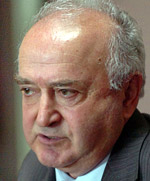“I call on everyone to find the 2000 incorrupt people, have them come to the polls and let’s all fight together. It’s a shame that we can’t find them,” said senior member of the Intellectuals’ Forum and academician Lenser Aghalovyan during another meeting with oppositionists at the “Armenia-Marriot” hotel.
No matter how strange the academician’s call sounds at first, the reality is that the Armenian opposition isn’t really sure if it has trustworthy people who won’t be bought and can be members of the electoral commissions during the upcoming 2007 parliamentary elections. I must say that the opposition has every right to worry because the previous elections have gone to show that many oppositionist members of the electoral commissions have been bought. There are some cases, especially during the community head elections when oppositionists themselves approached the pro-government candidate and offered to do whatever he said. We can accuse Republican Party member Galust Sahakyan of many things, but we have to agree with him that there is always a buyer if the oppositionist chooses to be bought.
The most recent case of the oppositionists selling their electoral commission seats was the village head elections of the Dalar village of the Ararat region on November 26, when the widow of the assassinated village head officially announced that the oppositionist parties represented in the electoral commissions had sold their spots. The probability that this trade is guided by the leaders of oppositionist parties because first of all, each leader of an oppositionist party doesn’t need 200 dollars which he still has to share with the rest of the bought commission members, and secondly, the leaders really need incorrupt commission members in order to back the oppositionist leaders who have rather big ambitions in the parliamentary and presidential elections.
So, academician Lenser Aghalovyan’s issue, which the oppositionists can’t say anything against, is really serious and the opposition wanted to solve that issue by stating in the voting code of Armenia that parties must have the right to call back their party representatives from the electoral commissions. That proposal was made based on the fact that the opposition simply can’t fight against the “sale” of its own representatives in the electoral commissions. The pro-government parties, however, rejected that proposal for the voting code because they’re still going to need the seats of the oppositionists in the electoral commissions no matter how much advice Galust Sahakyan will give to the opposition to not sell the seats.
So, even if that reform was approved for the voting code, it still wouldn’t be the solution to the problem because there is no guarantee that the next member appointed after the other oppositionist commission member won’t be corrupt. After all, if the opposition had the needed 2000 incorrupt members to appoint in all the electoral commissions of Armenia, then the oppositionist parties wouldn’t feel the need to propose making a reform in the voting code and the changing of this or that commission member on the threshold of the elections may simply be fatal for any electoral process.
In the end, it’s hard to say why the opposition can’t find the 2000 incorrupt members. Is it because there is no incorrupt person, or is it because there are very few people who actually trust the pro-government parties and the opposition? However, no matter how strange it may sound, the current, main issue of the opposition is to find the 2000 incorrupt people. Of course, they can declare a contest for 2000 incorrupt people, but that’s not the solution taking into consideration the illegitimacy of the different contests. If we take a closer look at the issue, which was raised by Lenser Aghalovyan and didn’t’ get any feedback, it seems as though the same thing is going to happen. There will once again be the search for the guilty and the traitors; this has always been the case and may happen during the 2007 parliamentary elections.

